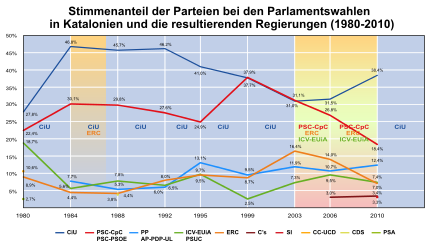Parliament of Catalonia
← 2017Parliamentary election in Catalonia 2021
(in %)
%
30
20
10
0
23,04
21,30
20,04
7,69
6,87
6,67
5,57
3,85
4,13
0,84
PSC units
ERC
Junts
VOX
ECP
CUP-G
Cs
PPC
Else.
L
Profits and losses
compared to 2017
%p
10
8
6
4
2
0
-2
-4
-6
-8
-10
-12
-14
-16
-18
-20
+9,18
−0,08
−1,62
+7,69
−0,59
+2,21
−19,78
−0,39
+3,00
+0,40
PSC units
ERC
Junts
VOX
ECP
CUP-G
Cs
PPC
Else.
L
Template:Election Chart/Maintenance/Notes
Notes:
b ERC electoral alliance with smaller parties.
c Junts electoral alliance with smaller parties
f Electoral alliance of the CUP with smaller parties
j Blank ballot papers
The Parliament of Catalonia (in Catalan Parlament de Catalunya, in Spanish Parlamento de Cataluña) is the regional parliament of the Spanish autonomous community of Catalonia, which drafts and passes laws, elects the President of the Generalitat de Catalunya and controls the government of Catalonia.
The Parliament building is located in the Parc de la Ciutadella in Barcelona.

Development of the percentage of votes of the parties in the elections to the Catalan parliament until 2010 and the party coalitions governing in Catalonia during the respective legislative period
History
The first representative and legislative bodies in Catalonia were the assemblies de pau i treva (peace and truce), whose earliest mention dates back to 1027. These were originally ad hoc meetings at the local level, convened by the clergy (Oliba, Bishop of Vic, who died in 1046, was a notable instigator, but was gradually incorporated into the court of the Counts of Barcelona). The first Catalan legal text, the Usatges de Barcelona, was promulgated by Count Ramon Berenguer I based on the decisions of these assemblies.
Catalonia has had the status of an autonomous community within the Spanish state since 1978. As part of the democratic reforms in Spain, the first legislative elections in Catalonia took place on 20 March 1980 under the Statute of Autonomy of 1979. This first Statute of Autonomy was replaced in 2006 by a new version with extended powers. Furthermore, a majority of Catalan parties are seeking an extension of autonomous powers. On 9 November 2015, parliament passed a resolution on secession from Spain ("Resolution on the start of the political process in Catalonia as a result of the election result of 27 September 2015"). According to this, the Catalans should be independent by 2017. 72 MPs voted in favour of the pro-independence proposal, 63 against. In its ruling of 2 December 2015, the Constitutional Court upheld a complaint and declared the parliamentary resolution of 9 November 2015 unconstitutional and null and void.
Voting system
The Parliament of Catalonia consists of 135 deputies elected every four years by direct universal suffrage. They are elected in four constituencies (the provinces): 85 in the Barcelona constituency, 17 in the Girona constituency, 15 in the Lleida constituency and 18 in the Tarragona constituency. The allocation of mandates is carried out in the D'Hondt procedure at the level of the constituencies alone. Only parties that have obtained at least three per cent of the votes in the respective constituency will be considered. The distribution of seats among the four constituencies has remained unchanged since 1980 and even then did not follow pure proportional representation. In the 2012 election, there were approximately 47,500 eligible voters for one mandate in the province of Barcelona, 29,500 in the province of Girona, 20,900 in the province of Lleida and 30,900 in the province of Tarragona. Since the seats are distributed solely at constituency level without any equalisation, this, combined with the unequal ratio of eligible voters per seat, means that a majority in parliament is not necessarily linked to a majority of the total votes.
Tasks
Parliament passes laws within the framework of the Statute of Autonomy. This regulates the powers of the autonomous community vis-à-vis those of the Spanish state on the one hand, and the interaction of the Catalan institutions on the other, and is thus the functional equivalent of a constitution. Amendments require the approval of the Catalan Parliament, the Spanish Parliament (in the form of an organic law) and the Catalan population through a referendum.
Parliament elects the President of the Generalitat de Catalunya (President of the Generalitat de Catalunya), who is the head of regional self-government. The President of the Generalitat may (Statute of Autonomy, art. 67 no. 8) appoint a Conseller Primer (as much as Prime Minister) and appoints the other consellers (as much as departmental ministers), who together form the Consell Executiu or Govern de la Generalitat de Catalunya (Regional Government).
All institutions of regional self-government together (parliament, president and government) form the Generalitat de Catalunya.
Search within the encyclopedia